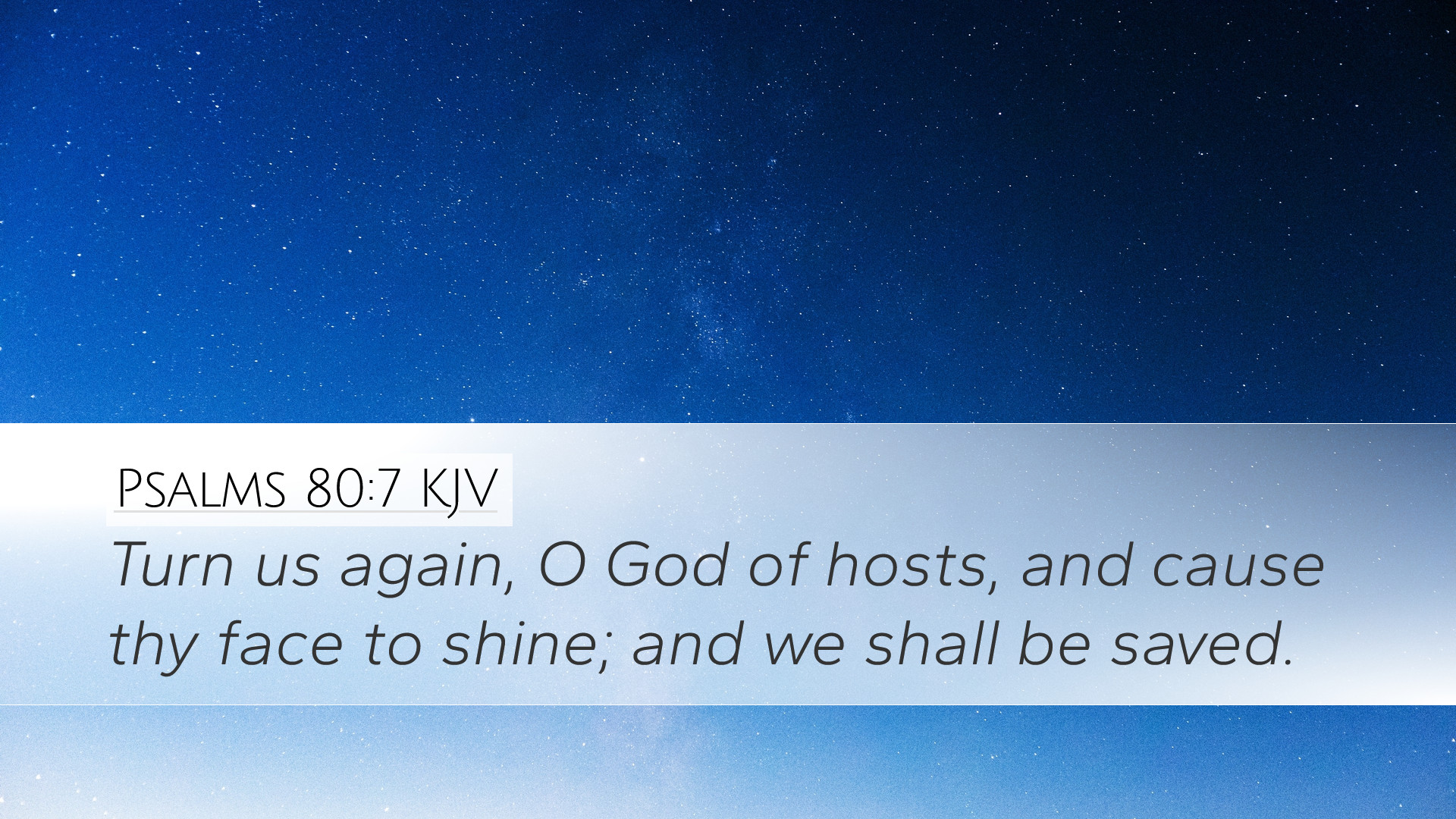Psalms 80:7 Commentary
Verse Reference: Psalms 80:7 (KJV) - "Turn us again, O God of hosts, and cause thy face to shine; and we shall be saved."
Introduction
The 80th Psalm is a communal lament, expressing the collective grief of the Israelites during a time of national distress. The psalmist fervently calls upon God to restore His people, recognizing their reliance on divine intervention for salvation. As we explore this verse, insights from prominent public domain commentators such as Matthew Henry, Albert Barnes, and Adam Clarke will illuminate its theological significance and practical implications.
Contextual Background
This psalm is attributed to Asaph, a leader of worship in Israel, whose writings reflect the struggles of the people of God amidst oppression and divine judgment. The call to "turn" signifies a plea for God to restore favor and blessing to Israel, a common theme in the psalms that acknowledges human weakness and the need for divine grace.
Detailed Commentary
1. Call to God - "Turn us again, O God of hosts"
Matthew Henry's Insight: Henry emphasizes the urgency of the cry for restoration, noting that "turning" implies a movement from a state of judgment to one of grace. He interprets the phrase "God of hosts" as a reminder of God's sovereign power over all creation, suggesting that He can indeed turn circumstances around for His people.
Albert Barnes' Perspective: Barnes relates the term "hosts" to God's authority over the heavenly armies and the natural elements. He posits that the plea is not merely for personal salvation but for the entire nation, seeking God’s intervention to address communal sin and hardship.
Adam Clarke's Commentary: Clarke adds that the use of "again" indicates that the people of Israel had previously enjoyed God’s favor, highlighting a history of relationship and the need for renewal. The repetition of this call reflects deep anguish and a longing for restoration.
2. The Divine Face - "and cause thy face to shine"
Theological Significance: The "face" of God is often symbolic of His presence and blessing. In biblical literature, the shining face of God signifies approval and favor, often contrasted with hiding His face due to disobedience.
Matthew Henry's View: Henry asserts that the shining of God’s face is equated with His mercy. When God turns to His people, His presence alone can bring hope and salvation. Thus, the psalmist yearns for a restoration of intimate communion with God.
Albert Barnes on Divine Favor: Barnes articulates that a shining face implies a visible manifestation of God's grace. He encourages the reader to see the importance of seeking God's favor in all circumstances as it is essential for spiritual and national well-being.
Adam Clarke's Interpretation: Clarke notes that the concept of God's face shining evokes an image of peace and prosperity that follows divine favor. He highlights that the restoration sought is holistic, impacting social, spiritual, and national dimensions of life.
3. The Promise of Salvation - "and we shall be saved"
Understanding Salvation: The promise of salvation is central to the believer's hope. The psalmist's confidence in God’s ability to save reflects a profound understanding of divine grace. This salvation is both immediate and eschatological, implying deliverance from present troubles and future judgment.
Matthew Henry's Comment: Henry stresses the assurance that comes with this plea; the psalmist believes that should God turn His face toward them, their current state of despair will inevitably change. This highlights the relationship between divine favor and human restoration.
Albert Barnes’ Exegesis: Barnes points out that this verse serves as a prayer of hope. The phrase "we shall be saved" speaks of a confidence derived from God’s past deliverances, suggesting a theological foundation for the faith of the psalmist and the people.
Adam Clarke's Elaboration: Clarke insists that the certainty of salvation reflects the character of God as one who is willing and able to save His people. He expresses this notion in terms of enduring hope shaped by remembrance of God's faithful actions in the past.
Implications for Today
This verse invites us to consider our own spiritual states and the condition of the world around us. Just as the Israelites called upon God, we too must recognize our need for divine assistance. The call for God to "turn" serves as a reminder of human fragility and dependence on God for restoration in various contexts - personal, communal, and global.
Reflection for Pastors and Leaders
For those in pastoral roles, this verse can serve as a powerful invocation for prayer and intercession. It encapsulates the essence of what it means to seek God earnestly on behalf of those in distress.
Encouragement for Students and Scholars
Students of scripture can take away the richness of the Hebrew understanding of salvation and the relational dynamics with God as portrayed in the psalm. This theological exploration encourages a deeper engagement with the text and its implications.
Conclusion
Psalms 80:7 is a poignant reminder of the necessity of divine intervention in our lives and communities. The unified call for God to restore and save resonates throughout generations and continues to call believers to humble reliance on His grace and mercy.


